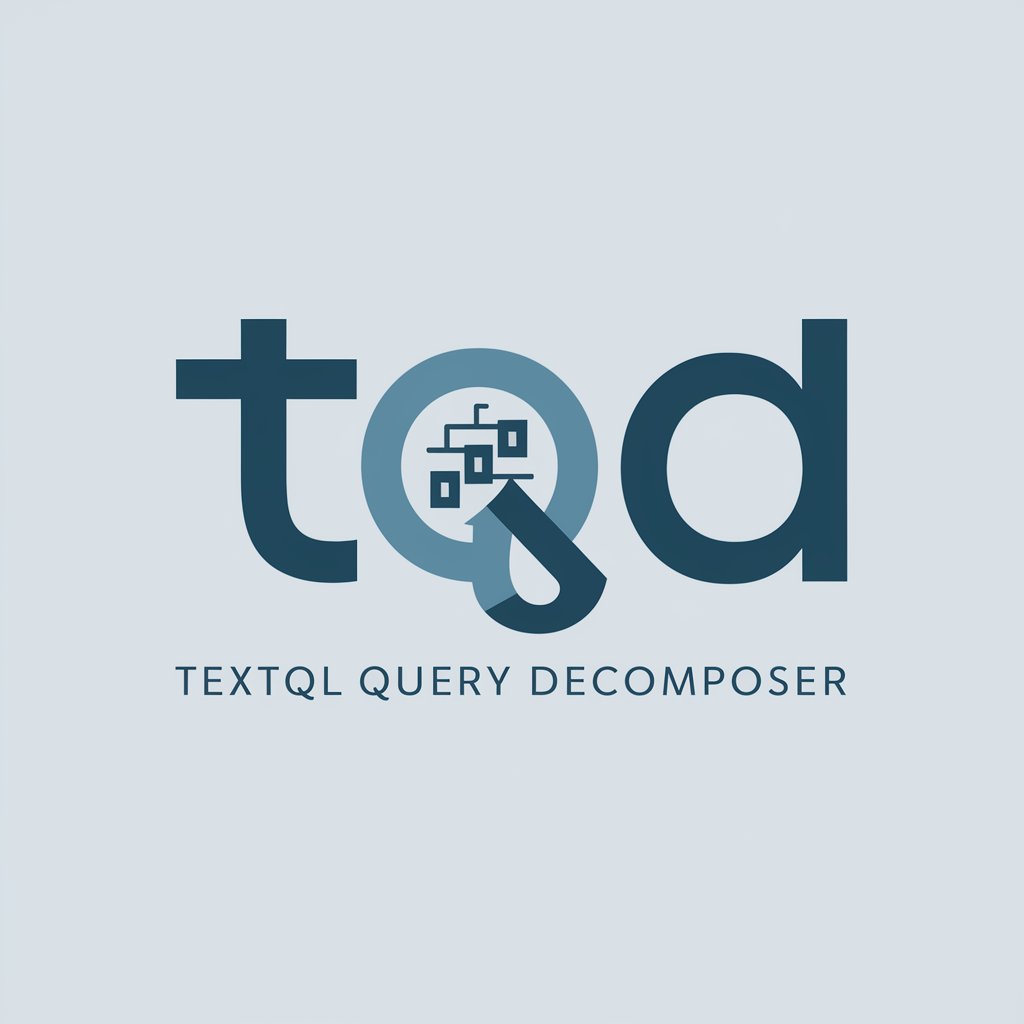TextQL Query Decomposer - SQL Query Decomposition

Welcome! Let's break down your data queries step by step.
Simplify SQL query crafting with AI
Find the total revenue for
List the users who
Identify the products with
Get the number of transactions that
Get Embed Code
Overview of TextQL Query Decomposer
TextQL Query Decomposer is a specialized tool designed to interpret and decompose natural language data queries into structured components that can be easily translated into SQL queries or other database query languages. Its primary function is to identify the core subject of a query and outline the various conditions attached to it. This decomposition process makes it simpler for data retrieval systems to understand and execute complex data requests. For instance, when presented with a query like 'find all active employees in the marketing department with more than five years of experience', TextQL Query Decomposer would break this down into a subject ('Employee') and conditionals related to department, activity status, and years of experience. Powered by ChatGPT-4o。

Core Functions of TextQL Query Decomposer
Subject Identification
Example
In the query 'List all high-value transactions from last quarter', the decomposer identifies 'Transactions' as the subject.
Scenario
This function is crucial in scenarios where data analysts are sifting through vast databases to find specific information, allowing them to focus their search on the relevant data points.
Conditional Extraction
Example
Given a query like 'Show revenue from blue widget sales in Europe in 2023', it extracts conditionals such as 'blue', 'in Europe', and 'in 2023'.
Scenario
This is particularly useful in filtering and refining search parameters in large datasets, enabling precise data extraction for reports or analyses.
Query Simplification
Example
For a complex question like 'What are the average monthly sales figures for products launched by the electronics department in the second half of last year?', it simplifies this into manageable components for query construction.
Scenario
This function aids in breaking down multifaceted questions into simpler queries, making it easier for non-technical users to interact with database systems.
Target Users of TextQL Query Decomposer
Data Analysts
Data analysts often deal with complex data retrieval tasks that require precise queries. TextQL Query Decomposer helps them by simplifying natural language requests into structured query components, enhancing efficiency and accuracy in data analysis.
Business Intelligence Professionals
BI professionals need to extract actionable insights from data. The decomposer facilitates this by enabling them to quickly translate business questions into data queries, speeding up the decision-making process.
Non-technical Business Users
Managers and decision-makers might not have technical expertise but need data insights. TextQL Query Decomposer allows them to make complex data requests in natural language, which are then structured for database queries, bridging the gap between business needs and data solutions.

How to Use TextQL Query Decomposer
1
Visit yeschat.ai to start using TextQL Query Decomposer for free, no ChatGPT Plus subscription or login required.
2
Input your data-related question in a clear, concise manner, focusing on the key metric or subject and any specific conditions.
3
Review the decomposed output, which includes the main subject of your query and a series of conditionals, structured for SQL query formulation.
4
Use the decomposed query as a blueprint to construct your SQL query, or provide it to your database management tool that supports automated query generation.
5
Optimize your query experience by refining your question based on the initial output, ensuring clarity and specificity to get the most accurate decomposed query.
Try other advanced and practical GPTs
Mainsplain AI
Clarity with a Touch of Sass

Kind Neuroscientist
Demystifying neuroscience with AI power.

APA Citation Checker - 7th edition
Ensuring APA compliance, effortlessly.

Prompt Wizard
Crafting Precision in Every Prompt

CLeAR GPT (NeuZeit CLeAR Evaluation)
Empower Your Projects with AI Insights

Wander Guide - Audio guided tours
Explore, Learn, and Discover with AI

Stream Wizard
Empowering VTubers with AI-driven streaming insights.

L'Influence Commerciale en France
Navigate commercial influence law with AI

C# Expert on Visual Studio
Empowering C# Development with AI

Fantasy Forge
Craft your fantasy realm with AI

Convention/Trade Show Finder
Navigate Events Seamlessly with AI

Ultimate Prompt Generator
Crafting Precision in AI Conversations

Frequently Asked Questions About TextQL Query Decomposer
What types of questions can TextQL Query Decomposer handle?
TextQL Query Decomposer is designed to process data-related questions that require extraction of a specific metric or subject, accompanied by conditions that refine the search, such as time frames, quantities, or attributes.
Can TextQL Query Decomposer generate SQL queries directly?
TextQL Query Decomposer does not generate SQL queries directly. Instead, it breaks down the question into a subject and conditionals that can be used as a blueprint for constructing SQL queries.
Is TextQL Query Decomposer suitable for beginners?
Yes, it is suitable for beginners and experienced users alike. It simplifies the process of formulating database queries by providing a clear breakdown of the query components.
How does TextQL Query Decomposer improve database query efficiency?
By decomposing complex questions into structured components, it helps users quickly identify the key elements of their query, reducing errors and improving the speed of query construction.
Can I use TextQL Query Decomposer with any database?
While TextQL Query Decomposer itself is database-agnostic, the effectiveness of the decomposed queries depends on your ability to translate them into the SQL syntax specific to your database system.
